A Comprehensive Report on Complementary and Orthodox Therapies
VerifiedAdded on 2024/05/16
|25
|5732
|318
Report
AI Summary
This assignment provides a comprehensive overview of complementary therapies, examining their treatment processes, advantages, and disadvantages, as well as factors influencing their accessibility. It delves into the role of these therapies in conjunction with orthodox treatments, evaluating attitudes towards them and assessing their psychological effects. The report also compares contra-indications between orthodox and complementary approaches and analyzes the reliability of information sources, using the case study of Katrina to evaluate evidence supporting the benefits of complementary therapies. Furthermore, it assesses the effectiveness of current regulatory systems and offers recommendations for improving these systems to ensure better patient care. The assignment concludes by highlighting the importance of integrating complementary therapies thoughtfully within healthcare practices.
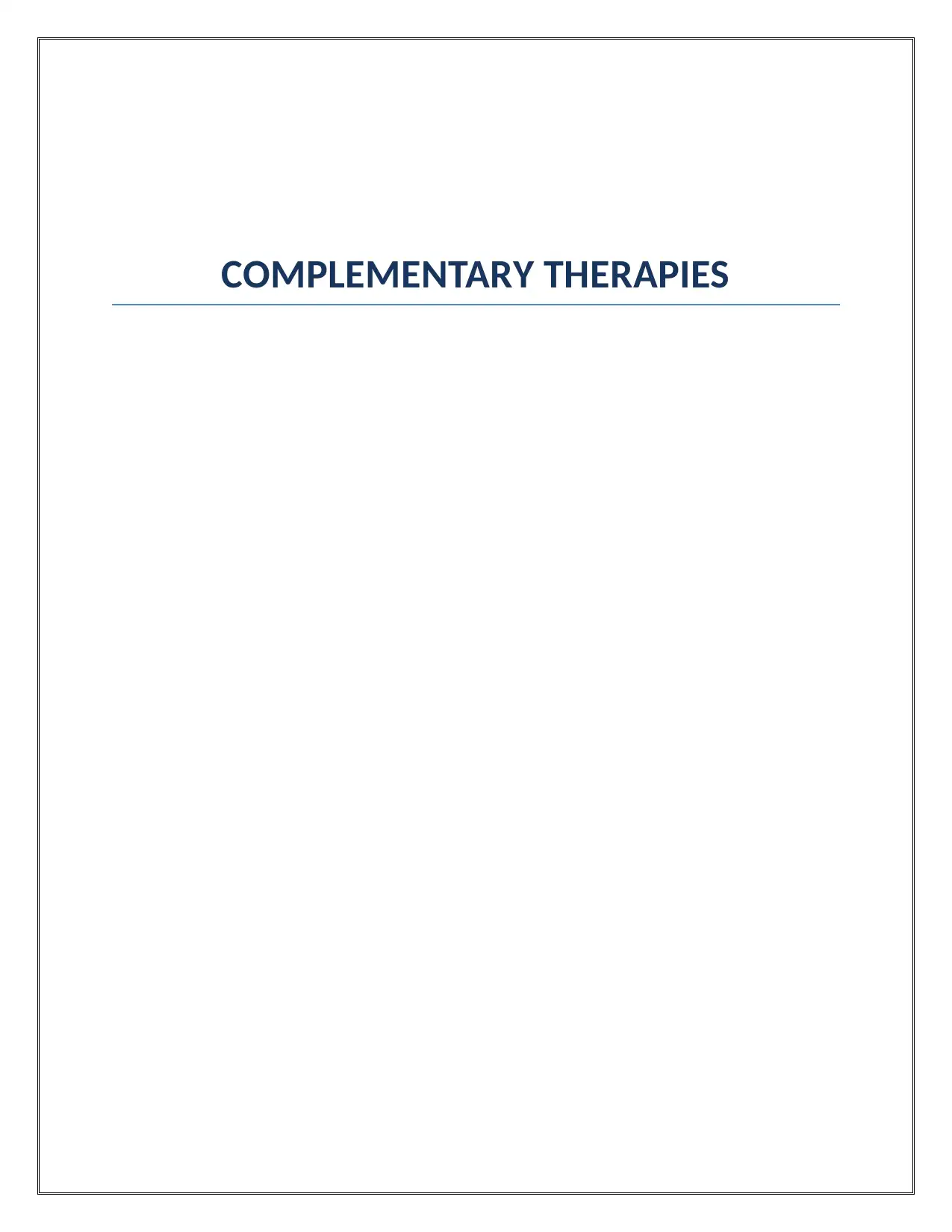
COMPLEMENTARY THERAPIES
Paraphrase This Document
Need a fresh take? Get an instant paraphrase of this document with our AI Paraphraser
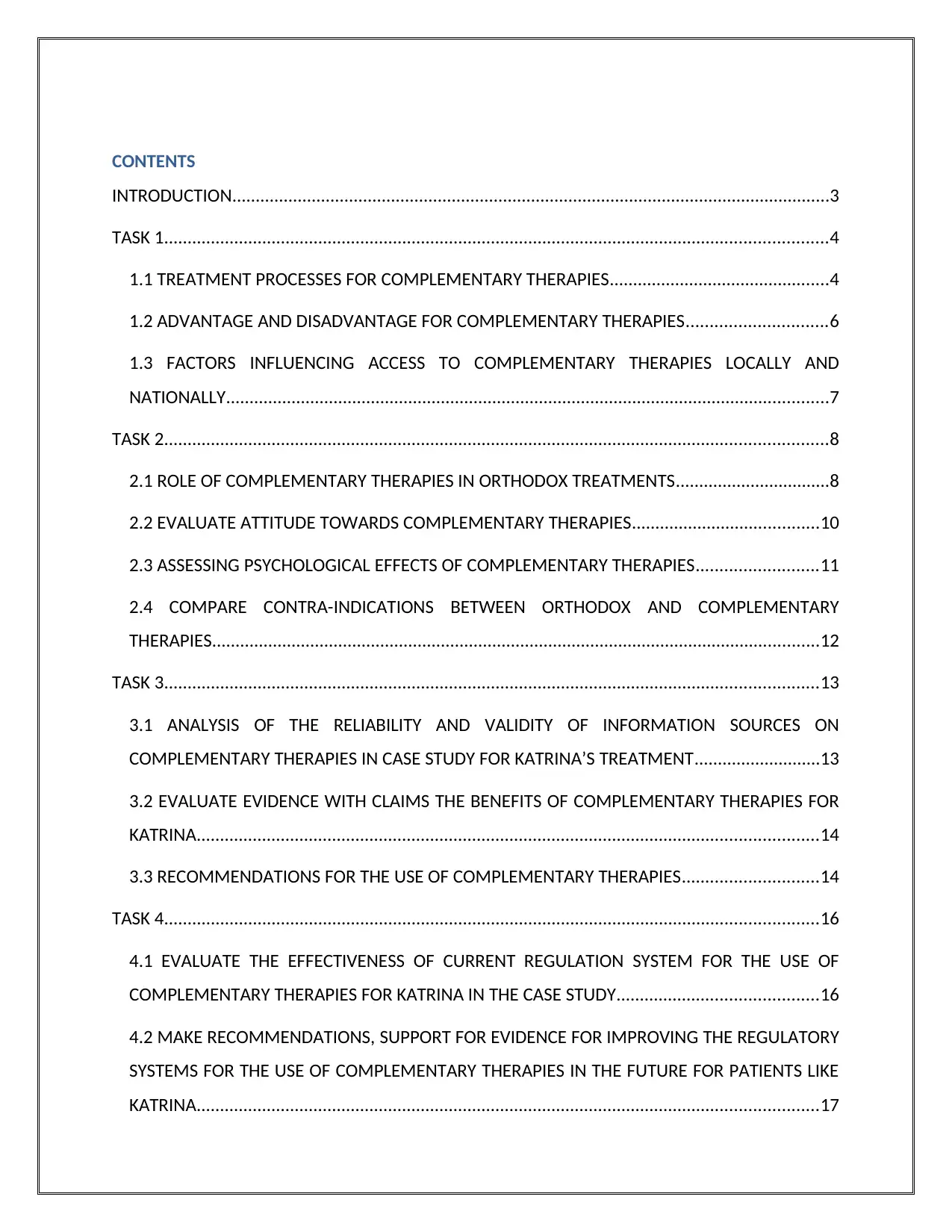
CONTENTS
INTRODUCTION................................................................................................................................3
TASK 1..............................................................................................................................................4
1.1 TREATMENT PROCESSES FOR COMPLEMENTARY THERAPIES...............................................4
1.2 ADVANTAGE AND DISADVANTAGE FOR COMPLEMENTARY THERAPIES..............................6
1.3 FACTORS INFLUENCING ACCESS TO COMPLEMENTARY THERAPIES LOCALLY AND
NATIONALLY.................................................................................................................................7
TASK 2..............................................................................................................................................8
2.1 ROLE OF COMPLEMENTARY THERAPIES IN ORTHODOX TREATMENTS.................................8
2.2 EVALUATE ATTITUDE TOWARDS COMPLEMENTARY THERAPIES........................................10
2.3 ASSESSING PSYCHOLOGICAL EFFECTS OF COMPLEMENTARY THERAPIES..........................11
2.4 COMPARE CONTRA-INDICATIONS BETWEEN ORTHODOX AND COMPLEMENTARY
THERAPIES..................................................................................................................................12
TASK 3............................................................................................................................................13
3.1 ANALYSIS OF THE RELIABILITY AND VALIDITY OF INFORMATION SOURCES ON
COMPLEMENTARY THERAPIES IN CASE STUDY FOR KATRINA’S TREATMENT...........................13
3.2 EVALUATE EVIDENCE WITH CLAIMS THE BENEFITS OF COMPLEMENTARY THERAPIES FOR
KATRINA.....................................................................................................................................14
3.3 RECOMMENDATIONS FOR THE USE OF COMPLEMENTARY THERAPIES.............................14
TASK 4............................................................................................................................................16
4.1 EVALUATE THE EFFECTIVENESS OF CURRENT REGULATION SYSTEM FOR THE USE OF
COMPLEMENTARY THERAPIES FOR KATRINA IN THE CASE STUDY...........................................16
4.2 MAKE RECOMMENDATIONS, SUPPORT FOR EVIDENCE FOR IMPROVING THE REGULATORY
SYSTEMS FOR THE USE OF COMPLEMENTARY THERAPIES IN THE FUTURE FOR PATIENTS LIKE
KATRINA.....................................................................................................................................17
INTRODUCTION................................................................................................................................3
TASK 1..............................................................................................................................................4
1.1 TREATMENT PROCESSES FOR COMPLEMENTARY THERAPIES...............................................4
1.2 ADVANTAGE AND DISADVANTAGE FOR COMPLEMENTARY THERAPIES..............................6
1.3 FACTORS INFLUENCING ACCESS TO COMPLEMENTARY THERAPIES LOCALLY AND
NATIONALLY.................................................................................................................................7
TASK 2..............................................................................................................................................8
2.1 ROLE OF COMPLEMENTARY THERAPIES IN ORTHODOX TREATMENTS.................................8
2.2 EVALUATE ATTITUDE TOWARDS COMPLEMENTARY THERAPIES........................................10
2.3 ASSESSING PSYCHOLOGICAL EFFECTS OF COMPLEMENTARY THERAPIES..........................11
2.4 COMPARE CONTRA-INDICATIONS BETWEEN ORTHODOX AND COMPLEMENTARY
THERAPIES..................................................................................................................................12
TASK 3............................................................................................................................................13
3.1 ANALYSIS OF THE RELIABILITY AND VALIDITY OF INFORMATION SOURCES ON
COMPLEMENTARY THERAPIES IN CASE STUDY FOR KATRINA’S TREATMENT...........................13
3.2 EVALUATE EVIDENCE WITH CLAIMS THE BENEFITS OF COMPLEMENTARY THERAPIES FOR
KATRINA.....................................................................................................................................14
3.3 RECOMMENDATIONS FOR THE USE OF COMPLEMENTARY THERAPIES.............................14
TASK 4............................................................................................................................................16
4.1 EVALUATE THE EFFECTIVENESS OF CURRENT REGULATION SYSTEM FOR THE USE OF
COMPLEMENTARY THERAPIES FOR KATRINA IN THE CASE STUDY...........................................16
4.2 MAKE RECOMMENDATIONS, SUPPORT FOR EVIDENCE FOR IMPROVING THE REGULATORY
SYSTEMS FOR THE USE OF COMPLEMENTARY THERAPIES IN THE FUTURE FOR PATIENTS LIKE
KATRINA.....................................................................................................................................17
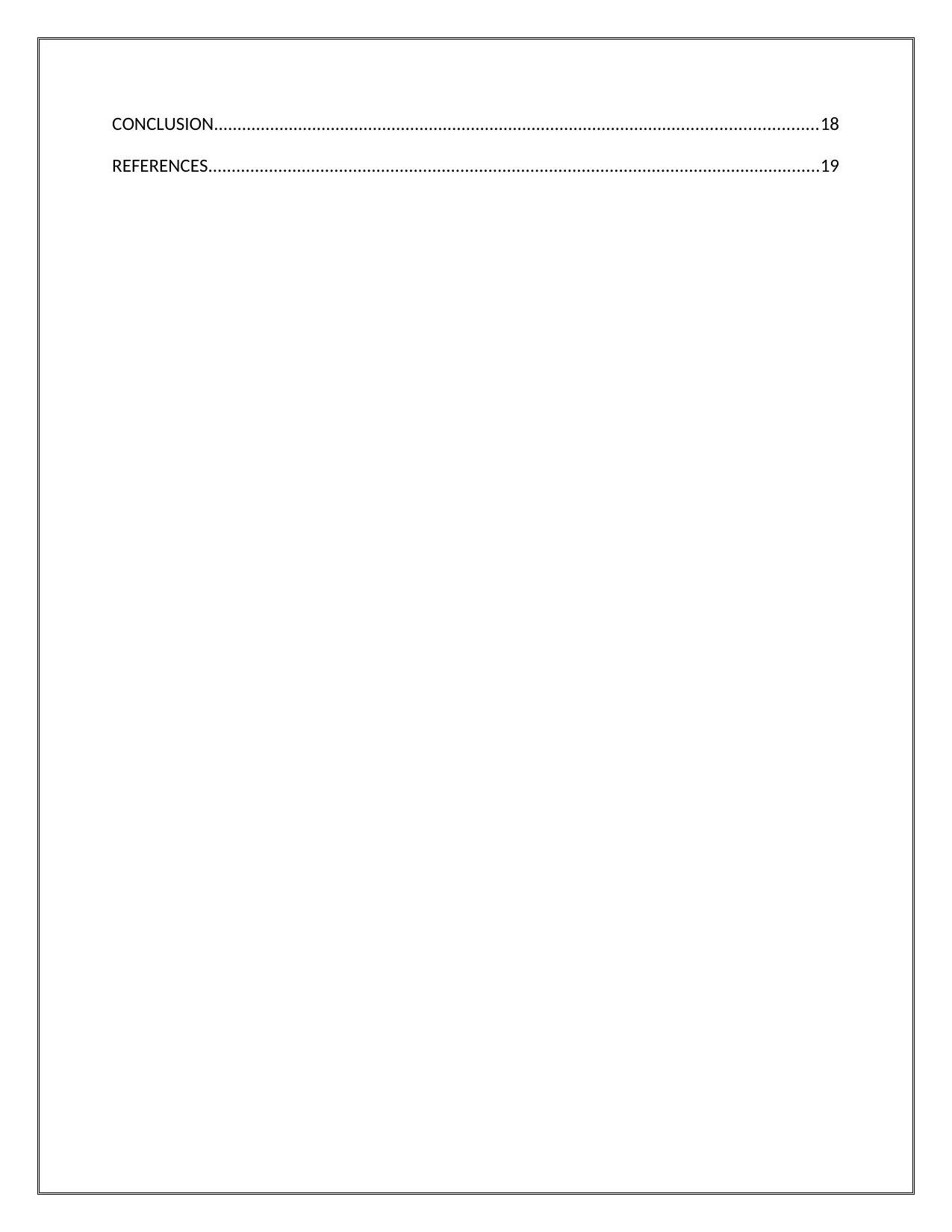
CONCLUSION.................................................................................................................................18
REFERENCES...................................................................................................................................19
REFERENCES...................................................................................................................................19
⊘ This is a preview!⊘
Do you want full access?
Subscribe today to unlock all pages.

Trusted by 1+ million students worldwide
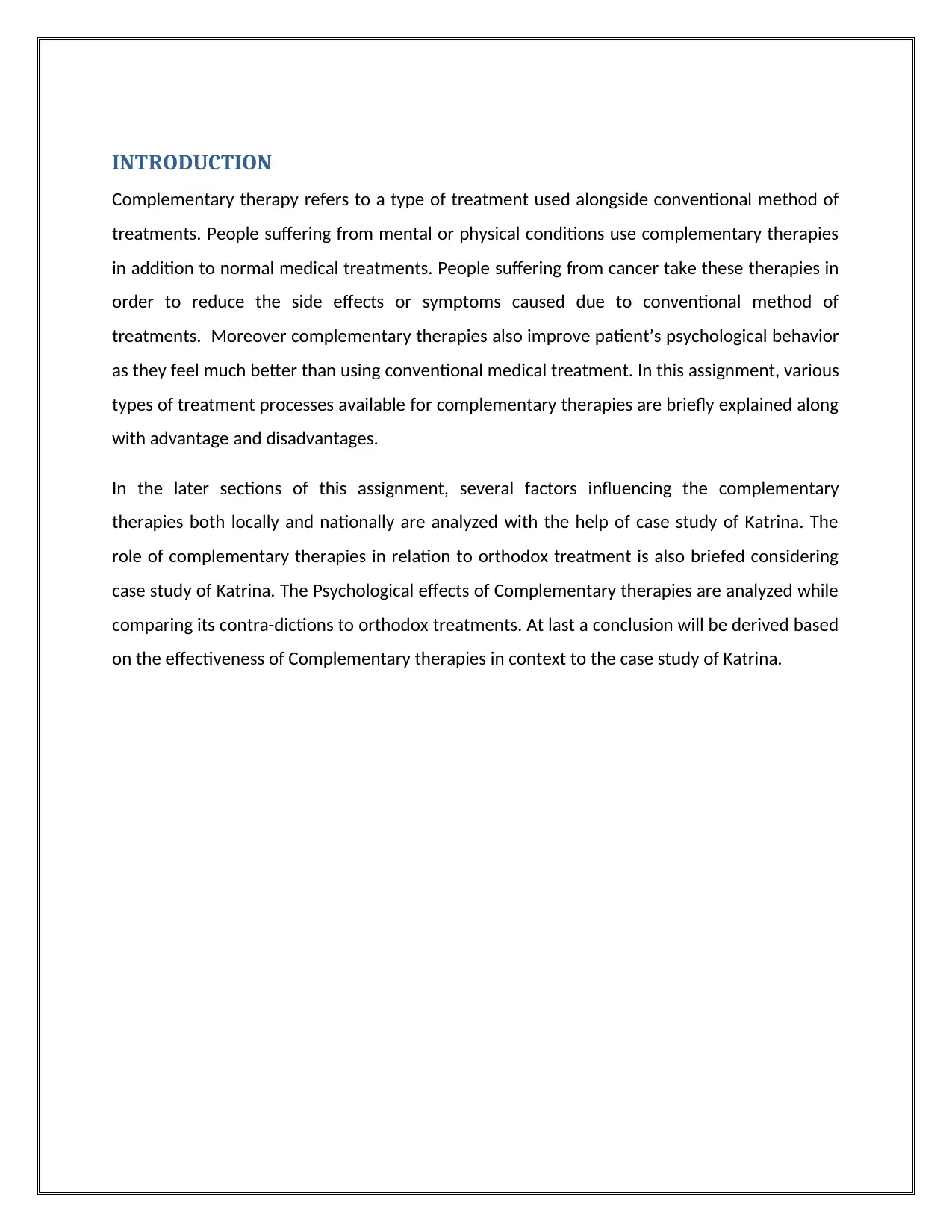
INTRODUCTION
Complementary therapy refers to a type of treatment used alongside conventional method of
treatments. People suffering from mental or physical conditions use complementary therapies
in addition to normal medical treatments. People suffering from cancer take these therapies in
order to reduce the side effects or symptoms caused due to conventional method of
treatments. Moreover complementary therapies also improve patient’s psychological behavior
as they feel much better than using conventional medical treatment. In this assignment, various
types of treatment processes available for complementary therapies are briefly explained along
with advantage and disadvantages.
In the later sections of this assignment, several factors influencing the complementary
therapies both locally and nationally are analyzed with the help of case study of Katrina. The
role of complementary therapies in relation to orthodox treatment is also briefed considering
case study of Katrina. The Psychological effects of Complementary therapies are analyzed while
comparing its contra-dictions to orthodox treatments. At last a conclusion will be derived based
on the effectiveness of Complementary therapies in context to the case study of Katrina.
Complementary therapy refers to a type of treatment used alongside conventional method of
treatments. People suffering from mental or physical conditions use complementary therapies
in addition to normal medical treatments. People suffering from cancer take these therapies in
order to reduce the side effects or symptoms caused due to conventional method of
treatments. Moreover complementary therapies also improve patient’s psychological behavior
as they feel much better than using conventional medical treatment. In this assignment, various
types of treatment processes available for complementary therapies are briefly explained along
with advantage and disadvantages.
In the later sections of this assignment, several factors influencing the complementary
therapies both locally and nationally are analyzed with the help of case study of Katrina. The
role of complementary therapies in relation to orthodox treatment is also briefed considering
case study of Katrina. The Psychological effects of Complementary therapies are analyzed while
comparing its contra-dictions to orthodox treatments. At last a conclusion will be derived based
on the effectiveness of Complementary therapies in context to the case study of Katrina.
Paraphrase This Document
Need a fresh take? Get an instant paraphrase of this document with our AI Paraphraser
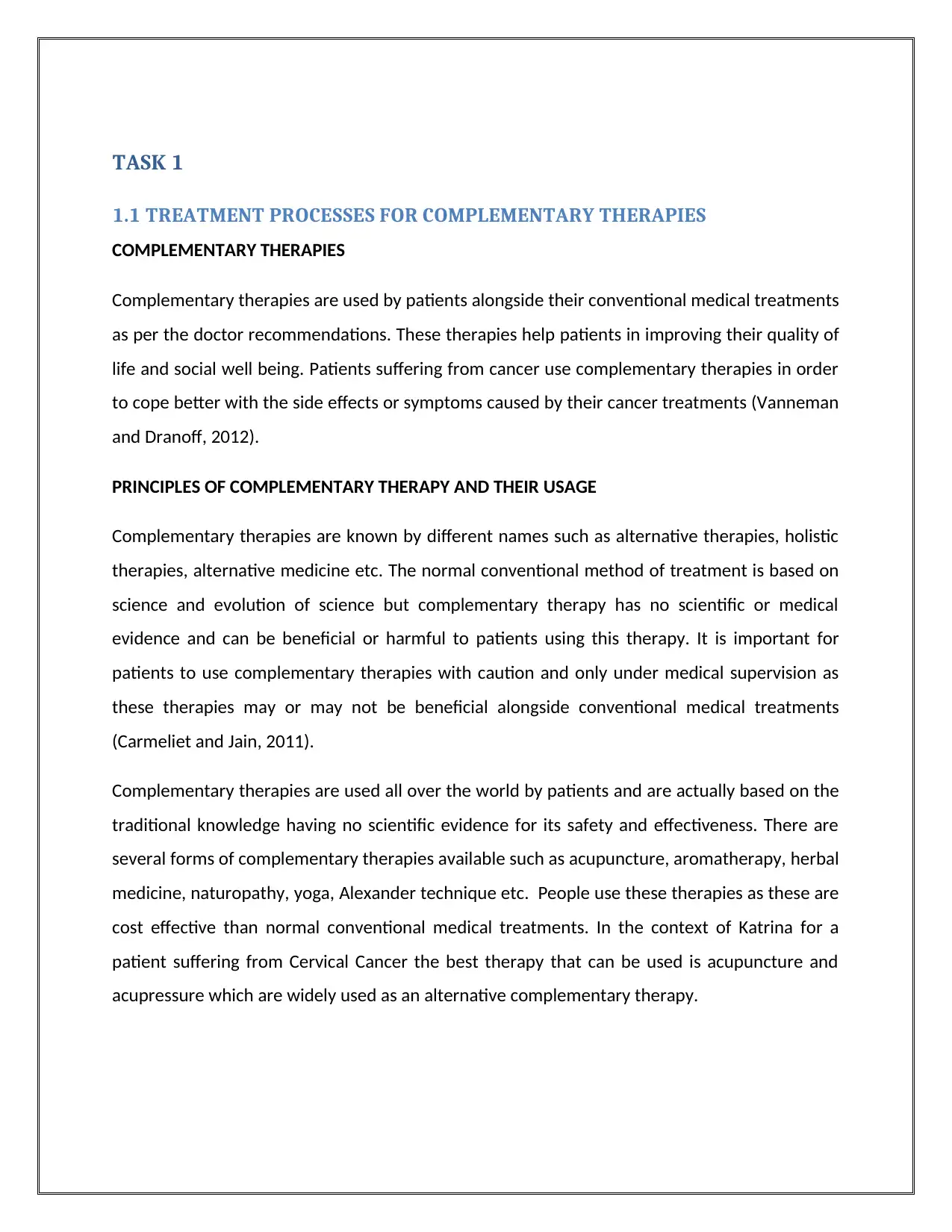
TASK 1
1.1 TREATMENT PROCESSES FOR COMPLEMENTARY THERAPIES
COMPLEMENTARY THERAPIES
Complementary therapies are used by patients alongside their conventional medical treatments
as per the doctor recommendations. These therapies help patients in improving their quality of
life and social well being. Patients suffering from cancer use complementary therapies in order
to cope better with the side effects or symptoms caused by their cancer treatments (Vanneman
and Dranoff, 2012).
PRINCIPLES OF COMPLEMENTARY THERAPY AND THEIR USAGE
Complementary therapies are known by different names such as alternative therapies, holistic
therapies, alternative medicine etc. The normal conventional method of treatment is based on
science and evolution of science but complementary therapy has no scientific or medical
evidence and can be beneficial or harmful to patients using this therapy. It is important for
patients to use complementary therapies with caution and only under medical supervision as
these therapies may or may not be beneficial alongside conventional medical treatments
(Carmeliet and Jain, 2011).
Complementary therapies are used all over the world by patients and are actually based on the
traditional knowledge having no scientific evidence for its safety and effectiveness. There are
several forms of complementary therapies available such as acupuncture, aromatherapy, herbal
medicine, naturopathy, yoga, Alexander technique etc. People use these therapies as these are
cost effective than normal conventional medical treatments. In the context of Katrina for a
patient suffering from Cervical Cancer the best therapy that can be used is acupuncture and
acupressure which are widely used as an alternative complementary therapy.
1.1 TREATMENT PROCESSES FOR COMPLEMENTARY THERAPIES
COMPLEMENTARY THERAPIES
Complementary therapies are used by patients alongside their conventional medical treatments
as per the doctor recommendations. These therapies help patients in improving their quality of
life and social well being. Patients suffering from cancer use complementary therapies in order
to cope better with the side effects or symptoms caused by their cancer treatments (Vanneman
and Dranoff, 2012).
PRINCIPLES OF COMPLEMENTARY THERAPY AND THEIR USAGE
Complementary therapies are known by different names such as alternative therapies, holistic
therapies, alternative medicine etc. The normal conventional method of treatment is based on
science and evolution of science but complementary therapy has no scientific or medical
evidence and can be beneficial or harmful to patients using this therapy. It is important for
patients to use complementary therapies with caution and only under medical supervision as
these therapies may or may not be beneficial alongside conventional medical treatments
(Carmeliet and Jain, 2011).
Complementary therapies are used all over the world by patients and are actually based on the
traditional knowledge having no scientific evidence for its safety and effectiveness. There are
several forms of complementary therapies available such as acupuncture, aromatherapy, herbal
medicine, naturopathy, yoga, Alexander technique etc. People use these therapies as these are
cost effective than normal conventional medical treatments. In the context of Katrina for a
patient suffering from Cervical Cancer the best therapy that can be used is acupuncture and
acupressure which are widely used as an alternative complementary therapy.
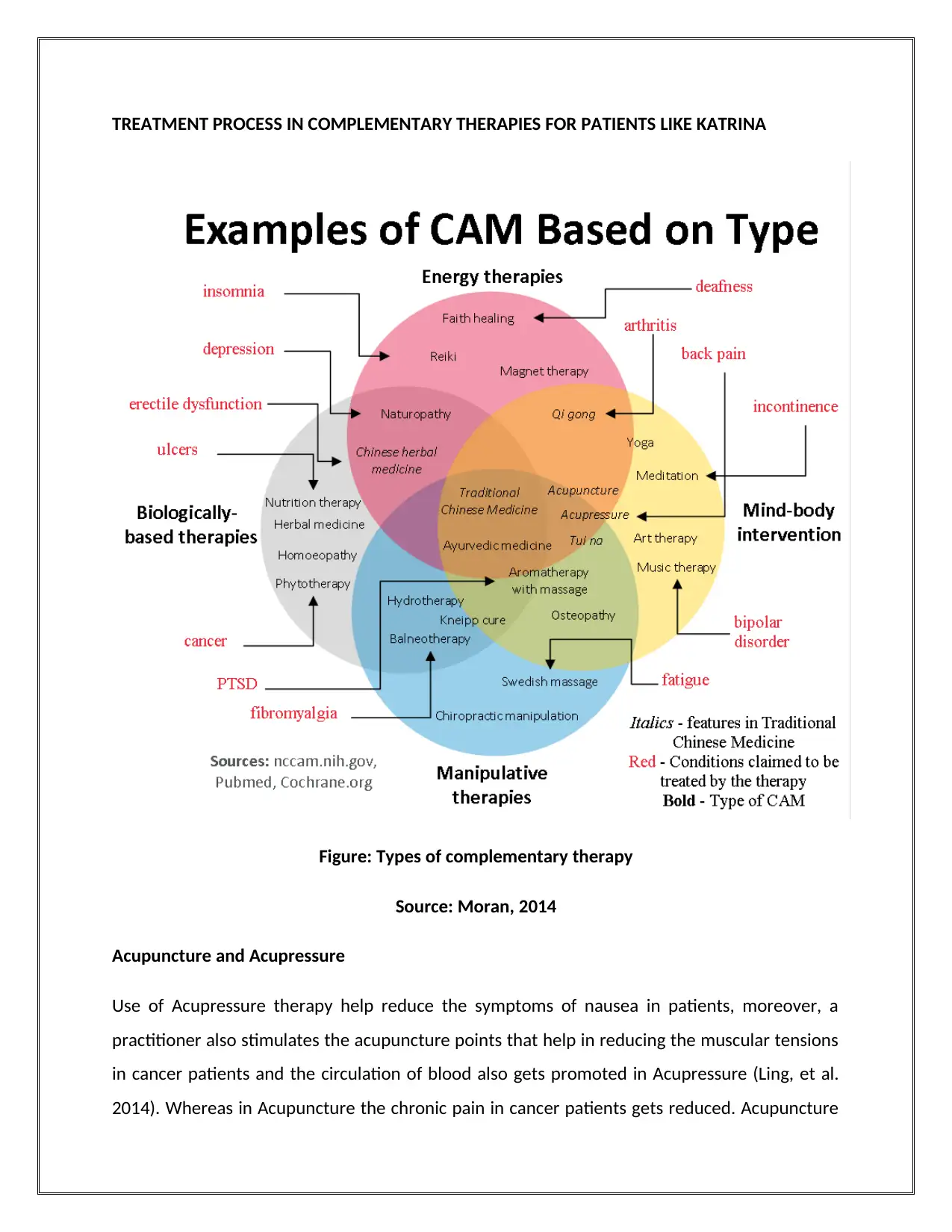
TREATMENT PROCESS IN COMPLEMENTARY THERAPIES FOR PATIENTS LIKE KATRINA
Figure: Types of complementary therapy
Source: Moran, 2014
Acupuncture and Acupressure
Use of Acupressure therapy help reduce the symptoms of nausea in patients, moreover, a
practitioner also stimulates the acupuncture points that help in reducing the muscular tensions
in cancer patients and the circulation of blood also gets promoted in Acupressure (Ling, et al.
2014). Whereas in Acupuncture the chronic pain in cancer patients gets reduced. Acupuncture
Figure: Types of complementary therapy
Source: Moran, 2014
Acupuncture and Acupressure
Use of Acupressure therapy help reduce the symptoms of nausea in patients, moreover, a
practitioner also stimulates the acupuncture points that help in reducing the muscular tensions
in cancer patients and the circulation of blood also gets promoted in Acupressure (Ling, et al.
2014). Whereas in Acupuncture the chronic pain in cancer patients gets reduced. Acupuncture
⊘ This is a preview!⊘
Do you want full access?
Subscribe today to unlock all pages.

Trusted by 1+ million students worldwide
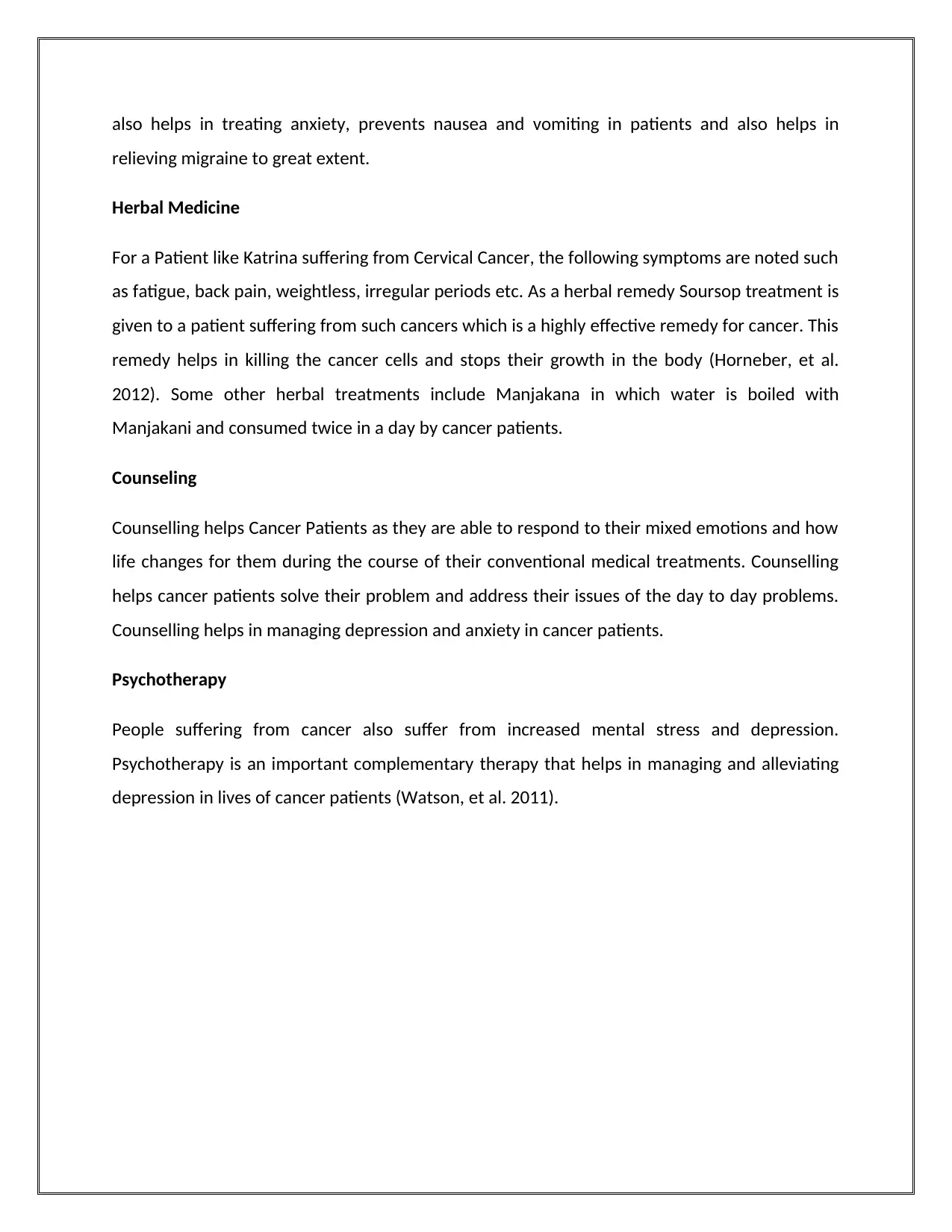
also helps in treating anxiety, prevents nausea and vomiting in patients and also helps in
relieving migraine to great extent.
Herbal Medicine
For a Patient like Katrina suffering from Cervical Cancer, the following symptoms are noted such
as fatigue, back pain, weightless, irregular periods etc. As a herbal remedy Soursop treatment is
given to a patient suffering from such cancers which is a highly effective remedy for cancer. This
remedy helps in killing the cancer cells and stops their growth in the body (Horneber, et al.
2012). Some other herbal treatments include Manjakana in which water is boiled with
Manjakani and consumed twice in a day by cancer patients.
Counseling
Counselling helps Cancer Patients as they are able to respond to their mixed emotions and how
life changes for them during the course of their conventional medical treatments. Counselling
helps cancer patients solve their problem and address their issues of the day to day problems.
Counselling helps in managing depression and anxiety in cancer patients.
Psychotherapy
People suffering from cancer also suffer from increased mental stress and depression.
Psychotherapy is an important complementary therapy that helps in managing and alleviating
depression in lives of cancer patients (Watson, et al. 2011).
relieving migraine to great extent.
Herbal Medicine
For a Patient like Katrina suffering from Cervical Cancer, the following symptoms are noted such
as fatigue, back pain, weightless, irregular periods etc. As a herbal remedy Soursop treatment is
given to a patient suffering from such cancers which is a highly effective remedy for cancer. This
remedy helps in killing the cancer cells and stops their growth in the body (Horneber, et al.
2012). Some other herbal treatments include Manjakana in which water is boiled with
Manjakani and consumed twice in a day by cancer patients.
Counseling
Counselling helps Cancer Patients as they are able to respond to their mixed emotions and how
life changes for them during the course of their conventional medical treatments. Counselling
helps cancer patients solve their problem and address their issues of the day to day problems.
Counselling helps in managing depression and anxiety in cancer patients.
Psychotherapy
People suffering from cancer also suffer from increased mental stress and depression.
Psychotherapy is an important complementary therapy that helps in managing and alleviating
depression in lives of cancer patients (Watson, et al. 2011).
Paraphrase This Document
Need a fresh take? Get an instant paraphrase of this document with our AI Paraphraser
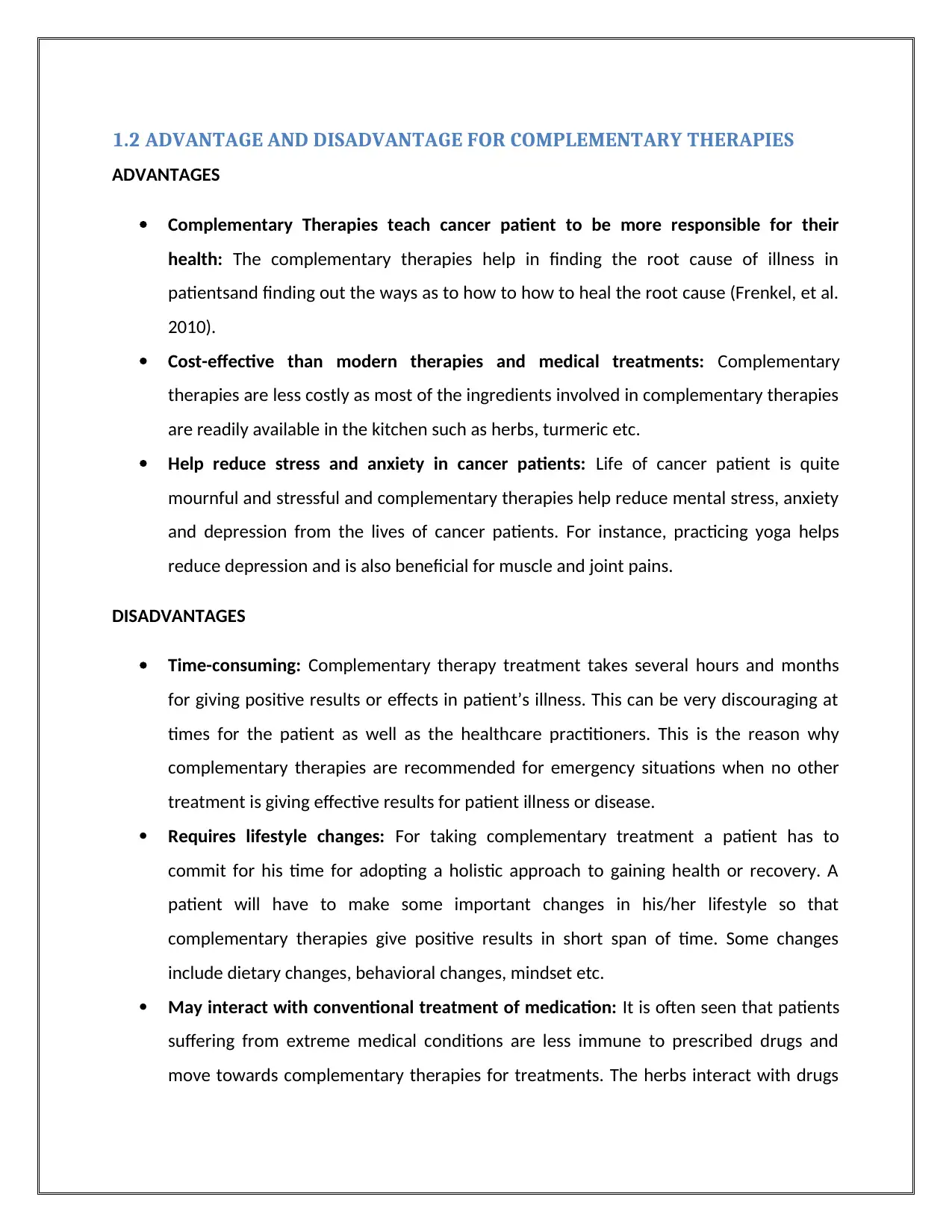
1.2 ADVANTAGE AND DISADVANTAGE FOR COMPLEMENTARY THERAPIES
ADVANTAGES
Complementary Therapies teach cancer patient to be more responsible for their
health: The complementary therapies help in finding the root cause of illness in
patientsand finding out the ways as to how to how to heal the root cause (Frenkel, et al.
2010).
Cost-effective than modern therapies and medical treatments: Complementary
therapies are less costly as most of the ingredients involved in complementary therapies
are readily available in the kitchen such as herbs, turmeric etc.
Help reduce stress and anxiety in cancer patients: Life of cancer patient is quite
mournful and stressful and complementary therapies help reduce mental stress, anxiety
and depression from the lives of cancer patients. For instance, practicing yoga helps
reduce depression and is also beneficial for muscle and joint pains.
DISADVANTAGES
Time-consuming: Complementary therapy treatment takes several hours and months
for giving positive results or effects in patient’s illness. This can be very discouraging at
times for the patient as well as the healthcare practitioners. This is the reason why
complementary therapies are recommended for emergency situations when no other
treatment is giving effective results for patient illness or disease.
Requires lifestyle changes: For taking complementary treatment a patient has to
commit for his time for adopting a holistic approach to gaining health or recovery. A
patient will have to make some important changes in his/her lifestyle so that
complementary therapies give positive results in short span of time. Some changes
include dietary changes, behavioral changes, mindset etc.
May interact with conventional treatment of medication: It is often seen that patients
suffering from extreme medical conditions are less immune to prescribed drugs and
move towards complementary therapies for treatments. The herbs interact with drugs
ADVANTAGES
Complementary Therapies teach cancer patient to be more responsible for their
health: The complementary therapies help in finding the root cause of illness in
patientsand finding out the ways as to how to how to heal the root cause (Frenkel, et al.
2010).
Cost-effective than modern therapies and medical treatments: Complementary
therapies are less costly as most of the ingredients involved in complementary therapies
are readily available in the kitchen such as herbs, turmeric etc.
Help reduce stress and anxiety in cancer patients: Life of cancer patient is quite
mournful and stressful and complementary therapies help reduce mental stress, anxiety
and depression from the lives of cancer patients. For instance, practicing yoga helps
reduce depression and is also beneficial for muscle and joint pains.
DISADVANTAGES
Time-consuming: Complementary therapy treatment takes several hours and months
for giving positive results or effects in patient’s illness. This can be very discouraging at
times for the patient as well as the healthcare practitioners. This is the reason why
complementary therapies are recommended for emergency situations when no other
treatment is giving effective results for patient illness or disease.
Requires lifestyle changes: For taking complementary treatment a patient has to
commit for his time for adopting a holistic approach to gaining health or recovery. A
patient will have to make some important changes in his/her lifestyle so that
complementary therapies give positive results in short span of time. Some changes
include dietary changes, behavioral changes, mindset etc.
May interact with conventional treatment of medication: It is often seen that patients
suffering from extreme medical conditions are less immune to prescribed drugs and
move towards complementary therapies for treatments. The herbs interact with drugs
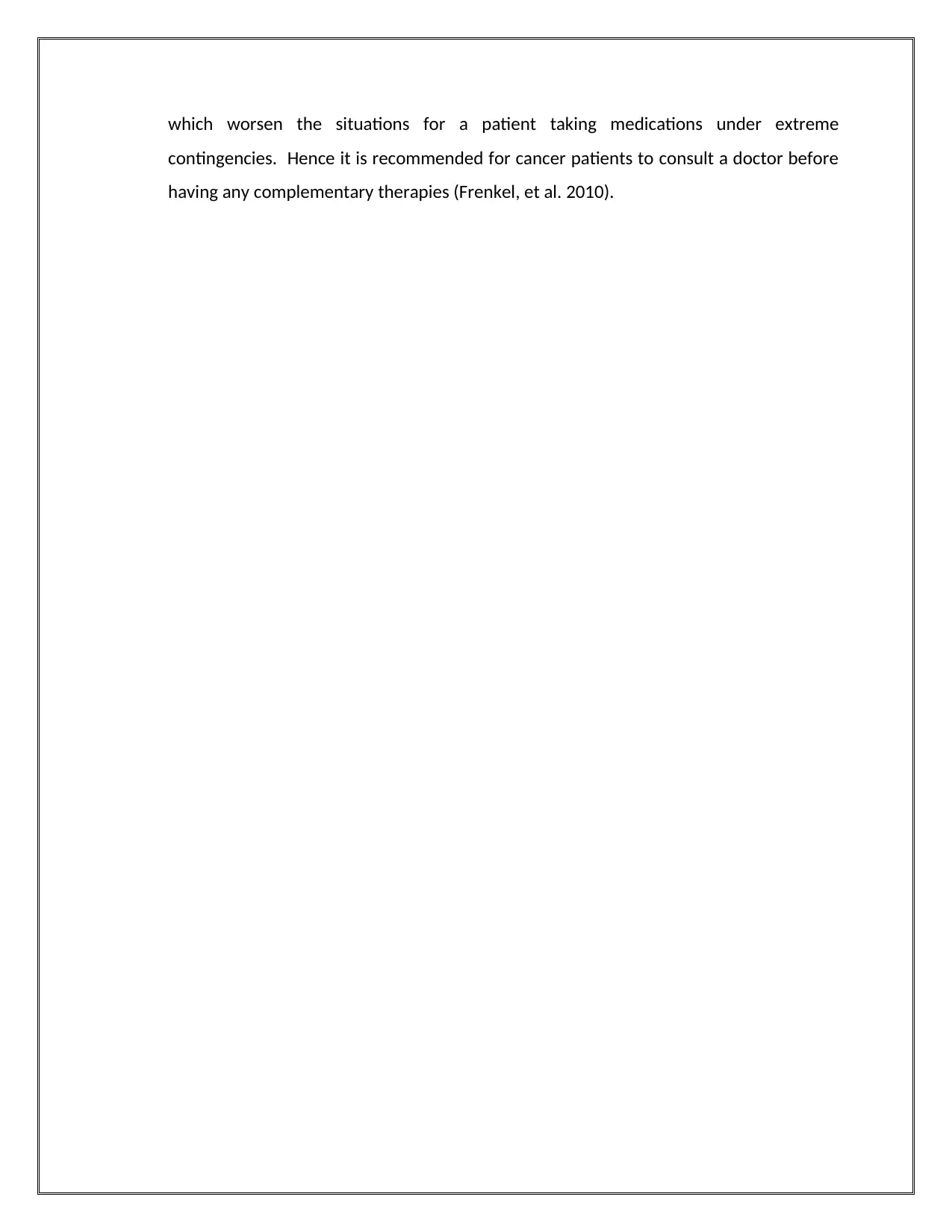
which worsen the situations for a patient taking medications under extreme
contingencies. Hence it is recommended for cancer patients to consult a doctor before
having any complementary therapies (Frenkel, et al. 2010).
contingencies. Hence it is recommended for cancer patients to consult a doctor before
having any complementary therapies (Frenkel, et al. 2010).
⊘ This is a preview!⊘
Do you want full access?
Subscribe today to unlock all pages.

Trusted by 1+ million students worldwide
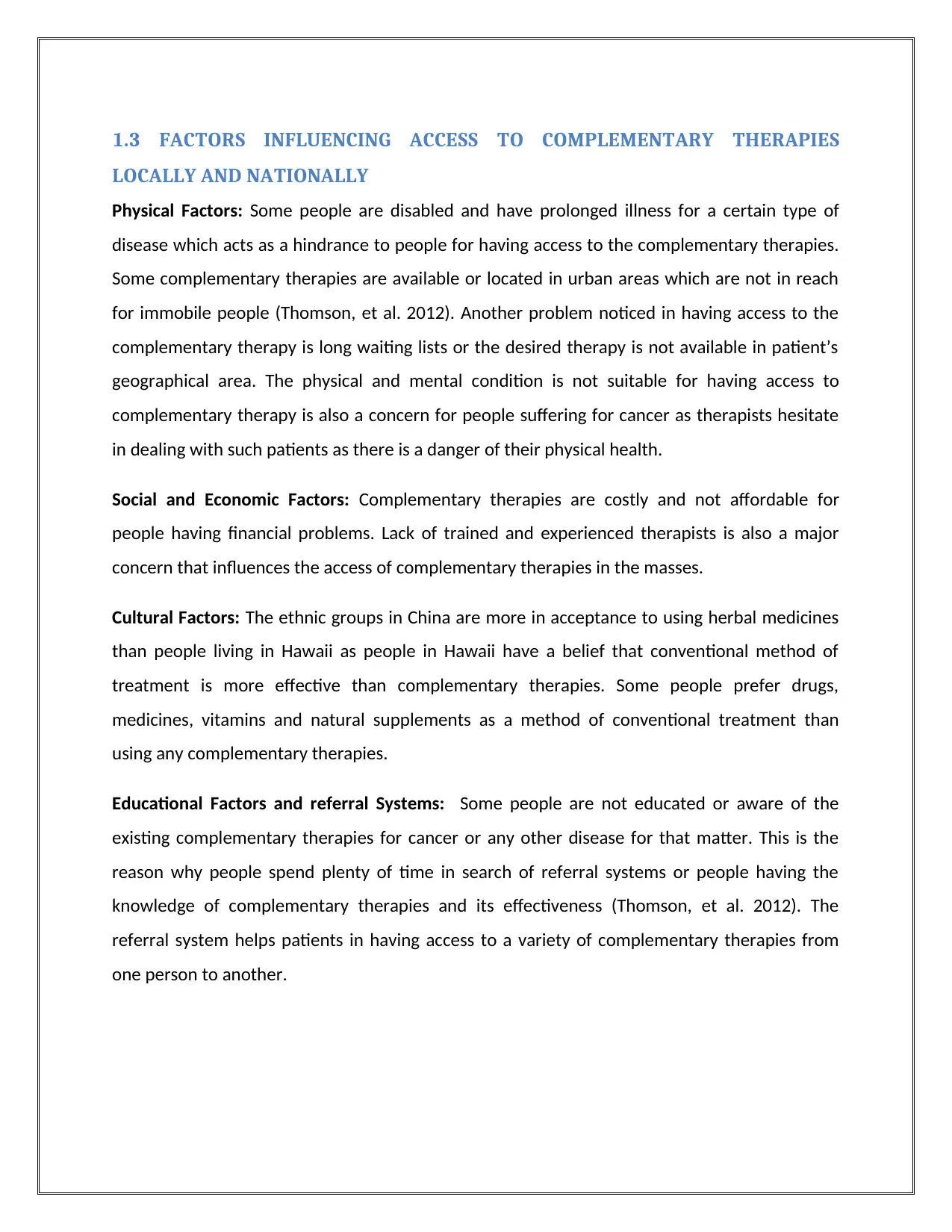
1.3 FACTORS INFLUENCING ACCESS TO COMPLEMENTARY THERAPIES
LOCALLY AND NATIONALLY
Physical Factors: Some people are disabled and have prolonged illness for a certain type of
disease which acts as a hindrance to people for having access to the complementary therapies.
Some complementary therapies are available or located in urban areas which are not in reach
for immobile people (Thomson, et al. 2012). Another problem noticed in having access to the
complementary therapy is long waiting lists or the desired therapy is not available in patient’s
geographical area. The physical and mental condition is not suitable for having access to
complementary therapy is also a concern for people suffering for cancer as therapists hesitate
in dealing with such patients as there is a danger of their physical health.
Social and Economic Factors: Complementary therapies are costly and not affordable for
people having financial problems. Lack of trained and experienced therapists is also a major
concern that influences the access of complementary therapies in the masses.
Cultural Factors: The ethnic groups in China are more in acceptance to using herbal medicines
than people living in Hawaii as people in Hawaii have a belief that conventional method of
treatment is more effective than complementary therapies. Some people prefer drugs,
medicines, vitamins and natural supplements as a method of conventional treatment than
using any complementary therapies.
Educational Factors and referral Systems: Some people are not educated or aware of the
existing complementary therapies for cancer or any other disease for that matter. This is the
reason why people spend plenty of time in search of referral systems or people having the
knowledge of complementary therapies and its effectiveness (Thomson, et al. 2012). The
referral system helps patients in having access to a variety of complementary therapies from
one person to another.
LOCALLY AND NATIONALLY
Physical Factors: Some people are disabled and have prolonged illness for a certain type of
disease which acts as a hindrance to people for having access to the complementary therapies.
Some complementary therapies are available or located in urban areas which are not in reach
for immobile people (Thomson, et al. 2012). Another problem noticed in having access to the
complementary therapy is long waiting lists or the desired therapy is not available in patient’s
geographical area. The physical and mental condition is not suitable for having access to
complementary therapy is also a concern for people suffering for cancer as therapists hesitate
in dealing with such patients as there is a danger of their physical health.
Social and Economic Factors: Complementary therapies are costly and not affordable for
people having financial problems. Lack of trained and experienced therapists is also a major
concern that influences the access of complementary therapies in the masses.
Cultural Factors: The ethnic groups in China are more in acceptance to using herbal medicines
than people living in Hawaii as people in Hawaii have a belief that conventional method of
treatment is more effective than complementary therapies. Some people prefer drugs,
medicines, vitamins and natural supplements as a method of conventional treatment than
using any complementary therapies.
Educational Factors and referral Systems: Some people are not educated or aware of the
existing complementary therapies for cancer or any other disease for that matter. This is the
reason why people spend plenty of time in search of referral systems or people having the
knowledge of complementary therapies and its effectiveness (Thomson, et al. 2012). The
referral system helps patients in having access to a variety of complementary therapies from
one person to another.
Paraphrase This Document
Need a fresh take? Get an instant paraphrase of this document with our AI Paraphraser
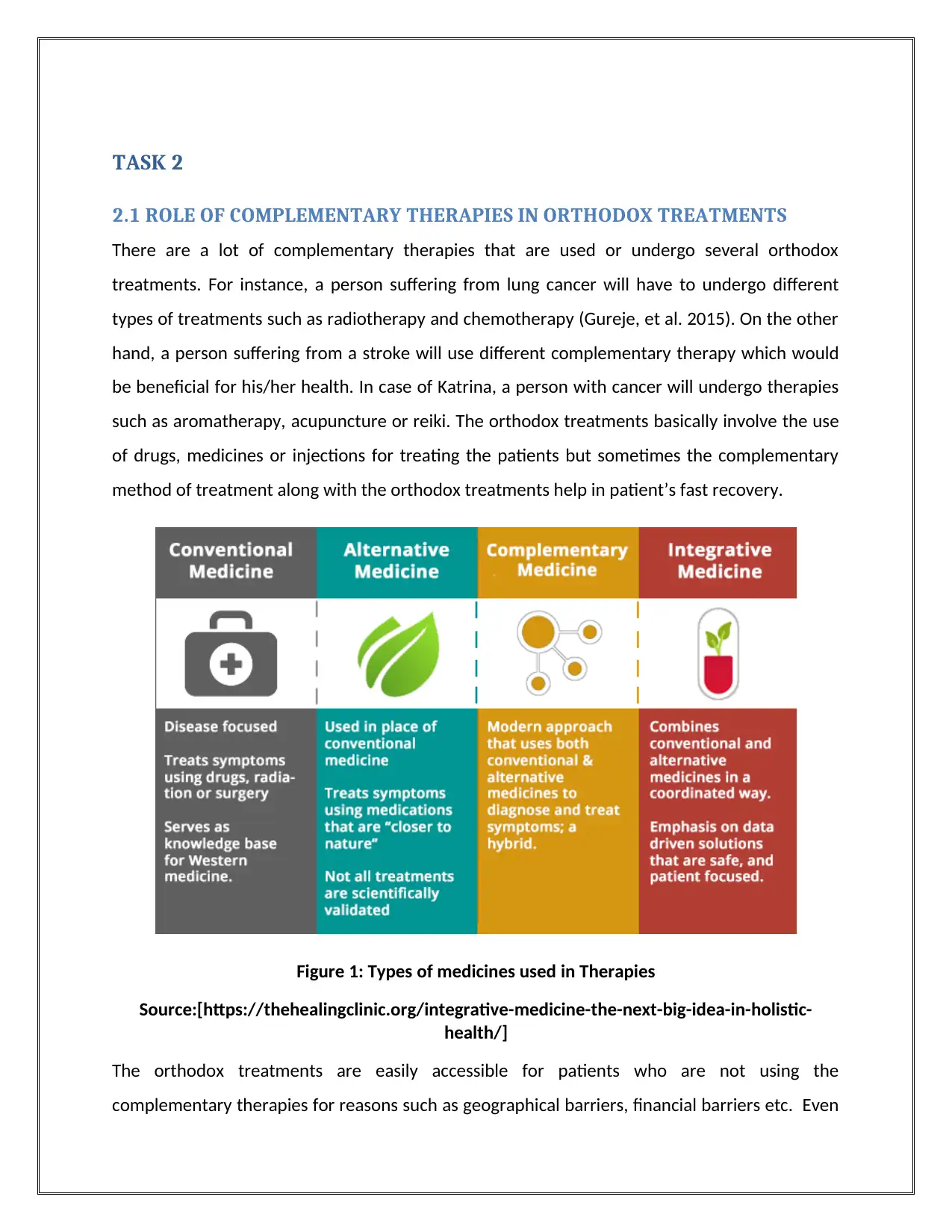
TASK 2
2.1 ROLE OF COMPLEMENTARY THERAPIES IN ORTHODOX TREATMENTS
There are a lot of complementary therapies that are used or undergo several orthodox
treatments. For instance, a person suffering from lung cancer will have to undergo different
types of treatments such as radiotherapy and chemotherapy (Gureje, et al. 2015). On the other
hand, a person suffering from a stroke will use different complementary therapy which would
be beneficial for his/her health. In case of Katrina, a person with cancer will undergo therapies
such as aromatherapy, acupuncture or reiki. The orthodox treatments basically involve the use
of drugs, medicines or injections for treating the patients but sometimes the complementary
method of treatment along with the orthodox treatments help in patient’s fast recovery.
Figure 1: Types of medicines used in Therapies
Source:[https://thehealingclinic.org/integrative-medicine-the-next-big-idea-in-holistic-
health/]
The orthodox treatments are easily accessible for patients who are not using the
complementary therapies for reasons such as geographical barriers, financial barriers etc. Even
2.1 ROLE OF COMPLEMENTARY THERAPIES IN ORTHODOX TREATMENTS
There are a lot of complementary therapies that are used or undergo several orthodox
treatments. For instance, a person suffering from lung cancer will have to undergo different
types of treatments such as radiotherapy and chemotherapy (Gureje, et al. 2015). On the other
hand, a person suffering from a stroke will use different complementary therapy which would
be beneficial for his/her health. In case of Katrina, a person with cancer will undergo therapies
such as aromatherapy, acupuncture or reiki. The orthodox treatments basically involve the use
of drugs, medicines or injections for treating the patients but sometimes the complementary
method of treatment along with the orthodox treatments help in patient’s fast recovery.
Figure 1: Types of medicines used in Therapies
Source:[https://thehealingclinic.org/integrative-medicine-the-next-big-idea-in-holistic-
health/]
The orthodox treatments are easily accessible for patients who are not using the
complementary therapies for reasons such as geographical barriers, financial barriers etc. Even
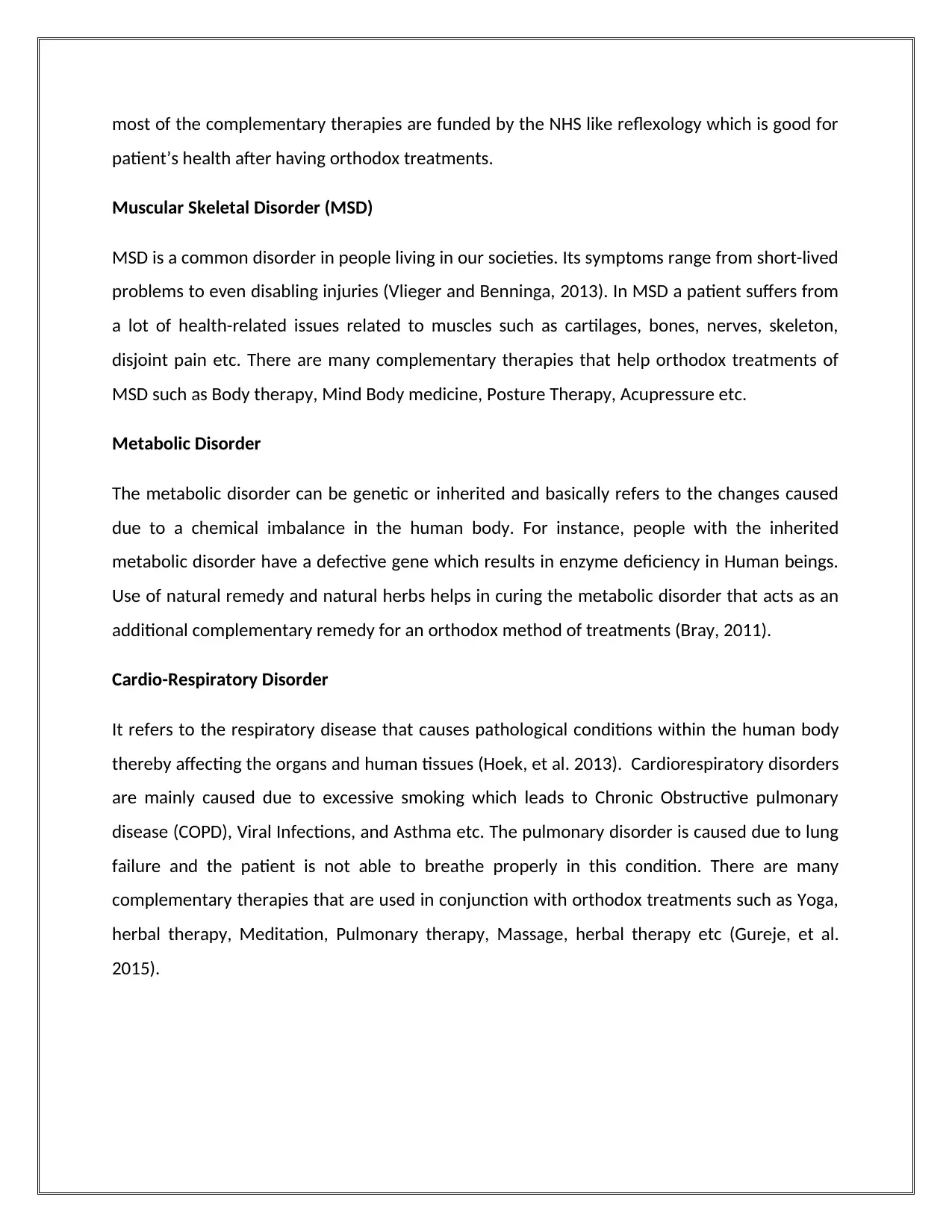
most of the complementary therapies are funded by the NHS like reflexology which is good for
patient’s health after having orthodox treatments.
Muscular Skeletal Disorder (MSD)
MSD is a common disorder in people living in our societies. Its symptoms range from short-lived
problems to even disabling injuries (Vlieger and Benninga, 2013). In MSD a patient suffers from
a lot of health-related issues related to muscles such as cartilages, bones, nerves, skeleton,
disjoint pain etc. There are many complementary therapies that help orthodox treatments of
MSD such as Body therapy, Mind Body medicine, Posture Therapy, Acupressure etc.
Metabolic Disorder
The metabolic disorder can be genetic or inherited and basically refers to the changes caused
due to a chemical imbalance in the human body. For instance, people with the inherited
metabolic disorder have a defective gene which results in enzyme deficiency in Human beings.
Use of natural remedy and natural herbs helps in curing the metabolic disorder that acts as an
additional complementary remedy for an orthodox method of treatments (Bray, 2011).
Cardio-Respiratory Disorder
It refers to the respiratory disease that causes pathological conditions within the human body
thereby affecting the organs and human tissues (Hoek, et al. 2013). Cardiorespiratory disorders
are mainly caused due to excessive smoking which leads to Chronic Obstructive pulmonary
disease (COPD), Viral Infections, and Asthma etc. The pulmonary disorder is caused due to lung
failure and the patient is not able to breathe properly in this condition. There are many
complementary therapies that are used in conjunction with orthodox treatments such as Yoga,
herbal therapy, Meditation, Pulmonary therapy, Massage, herbal therapy etc (Gureje, et al.
2015).
patient’s health after having orthodox treatments.
Muscular Skeletal Disorder (MSD)
MSD is a common disorder in people living in our societies. Its symptoms range from short-lived
problems to even disabling injuries (Vlieger and Benninga, 2013). In MSD a patient suffers from
a lot of health-related issues related to muscles such as cartilages, bones, nerves, skeleton,
disjoint pain etc. There are many complementary therapies that help orthodox treatments of
MSD such as Body therapy, Mind Body medicine, Posture Therapy, Acupressure etc.
Metabolic Disorder
The metabolic disorder can be genetic or inherited and basically refers to the changes caused
due to a chemical imbalance in the human body. For instance, people with the inherited
metabolic disorder have a defective gene which results in enzyme deficiency in Human beings.
Use of natural remedy and natural herbs helps in curing the metabolic disorder that acts as an
additional complementary remedy for an orthodox method of treatments (Bray, 2011).
Cardio-Respiratory Disorder
It refers to the respiratory disease that causes pathological conditions within the human body
thereby affecting the organs and human tissues (Hoek, et al. 2013). Cardiorespiratory disorders
are mainly caused due to excessive smoking which leads to Chronic Obstructive pulmonary
disease (COPD), Viral Infections, and Asthma etc. The pulmonary disorder is caused due to lung
failure and the patient is not able to breathe properly in this condition. There are many
complementary therapies that are used in conjunction with orthodox treatments such as Yoga,
herbal therapy, Meditation, Pulmonary therapy, Massage, herbal therapy etc (Gureje, et al.
2015).
⊘ This is a preview!⊘
Do you want full access?
Subscribe today to unlock all pages.

Trusted by 1+ million students worldwide
1 out of 25
Related Documents
Your All-in-One AI-Powered Toolkit for Academic Success.
+13062052269
info@desklib.com
Available 24*7 on WhatsApp / Email
![[object Object]](/_next/static/media/star-bottom.7253800d.svg)
Unlock your academic potential
Copyright © 2020–2026 A2Z Services. All Rights Reserved. Developed and managed by ZUCOL.




